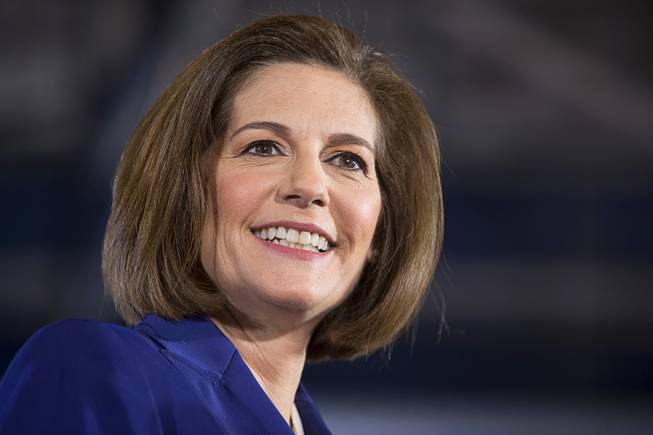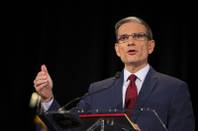
Nevada Senate candidate Catherine Cortez Masto speaks during a rally at Cheyenne High School in North Las Vegas Sunday, Oct. 23, 2016.
Published Saturday, Sept. 10, 2016 | 9:27 p.m.
Updated Tuesday, Nov. 8, 2016 | 9:48 p.m.

U.S. Rep. Joe Heck, R-Nev., speaks during the Nevada Senatorial Debate at Canyon Springs High School on Friday, Oct. 14, 2016, in North Las Vegas. The debate between Heck and Democratic U.S. Senate candidate Catherine Cortez Masto was televised statewide.
Democrat Catherine Cortez Masto made history tonight as the first Latina elected to the U.S. Senate.
Cortez Masto defeated three-term Republican Congressman Joe Heck. The former Nevada attorney general will replace retiring Democratic U.S. Sen. Harry Reid, who threw his full weight into ensuring that Cortez Masto would succeed him.
It took the crowd at the Aria several moments to realize that the race had been called for Cortez Masto. When it did, people erupted in a mild chorus of cheers but remained mostly subdued as they waited for the results of the presidential race.
It was long and tough road to the finish line for the candidates, both of whom announced their campaigns relatively early in 2015. Because neither faced a serious threat during the primary, they were able to spend the first year or so of their campaign fundraising and building up their images before the gloves really came off.
The granddaughter of a Mexican immigrant, Cortez Masto sought to emphasize her working-class roots while defining herself early on by her accomplishments as attorney general. On the campaign trail, she frequently highlighted her work to combat sex trafficking, ease the housing crisis and protect seniors.
Cortez Masto sought to tie Heck to Trump at every turn, whether it was highlighting Trump’s comments early on about Mexican immigrants or marching with Culinary Union workers on their picket line in front of the Trump International Hotel in Las Vegas. Culinary also played a key role in the race, mobilizing a hundred or so of its members as critical get-out-the-vote agents.
A number of issues dogged Cortez Masto throughout the campaign cycle as well — such as the argument that she used her position as attorney general to prosecute someone for political ends and her solid support for Hillary Clinton, even as many voters remained distrustful of the Democratic presidential candidate. Ads also accused her of ignoring Nevada’s rape kit backlog and traveling the world on the taxpayers’ dime.
The battle was hard-fought, with outside groups pouring more than $90 million into the race on top of the $18 million spent directly by the candidates. At times, the race seemed more like a showdown between Reid, fighting to preserve his legacy, and powerful Republican donors, like the conservative Koch brothers, who sought to deal Reid a final blow.
Republicans painted Cortez Masto early on as Reid’s “hand-picked candidate,” while Democrats frequently slammed Heck as someone who would simply do the Koch brothers’ bidding. Ultimately, it was the support that each candidate received from Reid or the Koch brothers that propelled them to the finish line.
The Koch brothers-backed Freedom Partners Action Fund alone spent more than $6 million supporting Heck, while Reid mobilized his machine in Nevada to turn out the vote for Cortez Masto, even dispatching some of his key staffers to Nevada to finish off the last couple of moths of the race.
Heck, a physician, Iraq war veteran and brigadier general in the U.S. Army Reserve, positioned himself as the stronger candidate on national security, hitting Cortez Masto on a nuanced question about the South China Sea during the candidates' only debate. He also touted typically conservative platforms such as wanting to repeal and replace the Affordable Care Act, while taking a more moderate position on immigration, including a path to citizenship for those in the country without authorization.
Republican presidential nominee Donald Trump was Heck’s cross to bear throughout the election cycle. First, Heck said he would support the Republican nominee. Then he unendorsed the candidate after the lewd comments Trump made on a hot mic in 2005 on “Access Hollywood” came to light. But a week or so before the election, Heck said he hadn’t made up his mind about whom to vote for in a local television interview.

Join the Discussion:
Check this out for a full explanation of our conversion to the LiveFyre commenting system and instructions on how to sign up for an account.
Full comments policy